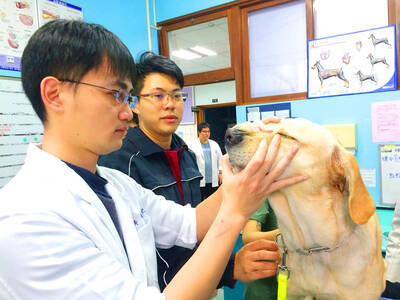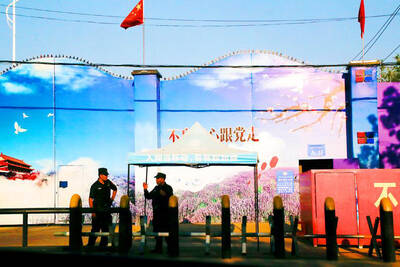A draft bill on protecting Taiwan from invasion is likely to be passed by the US Congress, but it remains to be seen how US President Joe Biden’s administration would implement the act if it is passed, Taiwanese academics said on Sunday.
US Senator Rick Scott and US Representative Guy Reschenthaler on Thursday reintroduced the proposed Taiwan Invasion Prevention Act, which was shelved in September last year due to the impending US presidential election.
Arthur Ding (丁樹範), a professor at National Chengchi University’s College of International Affairs, and Soong Hseik-wen (宋學文), a professor at National Chung Cheng University’s Graduate Institute of Strategy and International Affairs, said that the bill is likely to receive overwhelming support from US lawmakers.
Support for Taiwan under Biden is likely to remain unchanged from that under former US president Donald Trump, but specific policies would differ between the two administrations, Ding said.
China’s rise is threatening the peace and stability the US established in the Asia-Pacific region after World War II, Soong said.
“The bill is likely to pass, but the US would not advance prematurely on issues related to China. Biden would focus on internal issues first, and would take input from all sides on China,” he said.
The US would adopt a posture of readiness with its allies in the region, with whom it would seek to jointly restrict China’s rise, Soong said.
“With 40 years of political experience, Biden knows there is no need to chase a cornered enemy,” he said. “However, with the structural conflicts in the US-China relationship growing stronger, Biden cannot afford to give in.”
“China has already come under fire for its handling of the [COVID-19] pandemic, and for its wolf warrior diplomacy. Taiwan should continue to strengthen its democracy to further contrast itself from China in the international community,” Ding said.
Soong said Taiwan must continue to develop its asymmetrical warfare capabilities, while seeking to leverage its successful response to the pandemic and its strength in the semiconductor industry to expand its diplomatic space.
“Taiwan should also continue to emphasize that it is strategically important not only because of its geographical position in the first island chain, but also its political position as a strong democracy,” he said.

Former Czech Republic-based Taiwanese researcher Cheng Yu-chin (鄭宇欽) has been sentenced to seven years in prison on espionage-related charges, China’s Ministry of State Security announced yesterday. China said Cheng was a spy for Taiwan who “masqueraded as a professor” and that he was previously an assistant to former Cabinet secretary-general Cho Jung-tai (卓榮泰). President-elect William Lai (賴清德) on Wednesday last week announced Cho would be his premier when Lai is inaugurated next month. Today is China’s “National Security Education Day.” The Chinese ministry yesterday released a video online showing arrests over the past 10 years of people alleged to be

THE HAWAII FACTOR: While a 1965 opinion said an attack on Hawaii would not trigger Article 5, the text of the treaty suggests the state is covered, the report says NATO could be drawn into a conflict in the Taiwan Strait if Chinese forces attacked the US mainland or Hawaii, a NATO Defense College report published on Monday says. The report, written by James Lee, an assistant research fellow at Academia Sinica’s Institute of European and American Studies, states that under certain conditions a Taiwan contingency could trigger Article 5 of NATO, under which an attack against any member of the alliance is considered an attack against all members, necessitating a response. Article 6 of the North Atlantic Treaty specifies that an armed attack in the territory of any member in Europe,

LIKE FAMILY: People now treat dogs and cats as family members. They receive the same medical treatments and tests as humans do, a veterinary association official said The number of pet dogs and cats in Taiwan has officially outnumbered the number of human newborns last year, data from the Ministry of Agriculture’s pet registration information system showed. As of last year, Taiwan had 94,544 registered pet dogs and 137,652 pet cats, the data showed. By contrast, 135,571 babies were born last year. Demand for medical care for pet animals has also risen. As of Feb. 29, there were 5,773 veterinarians in Taiwan, 3,993 of whom were for pet animals, statistics from the Animal and Plant Health Inspection Agency showed. In 2022, the nation had 3,077 pediatricians. As of last

XINJIANG: Officials are conducting a report into amending an existing law or to enact a special law to prohibit goods using forced labor Taiwan is mulling an amendment prohibiting the importation of goods using forced labor, similar to the Uyghur Forced Labor Prevention Act (UFLPA) passed by the US Congress in 2021 that imposed limits on goods produced using forced labor in China’s Xinjiang region. A government official who wished to remain anonymous said yesterday that as the US customs law explicitly prohibits the importation of goods made using forced labor, in 2021 it passed the specialized UFLPA to limit the importation of cotton and other goods from China’s Xinjiang Uyghur region. Taiwan does not have the legal basis to prohibit the importation of goods